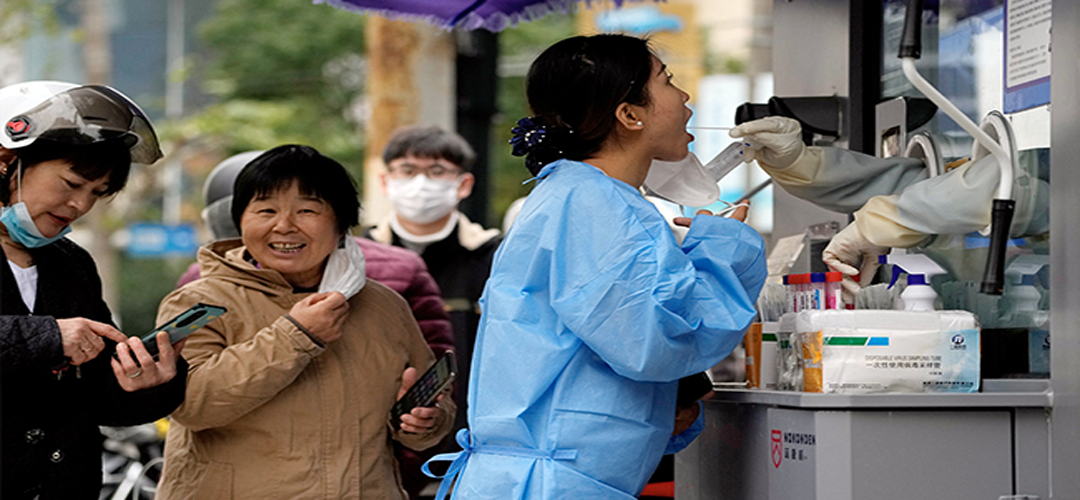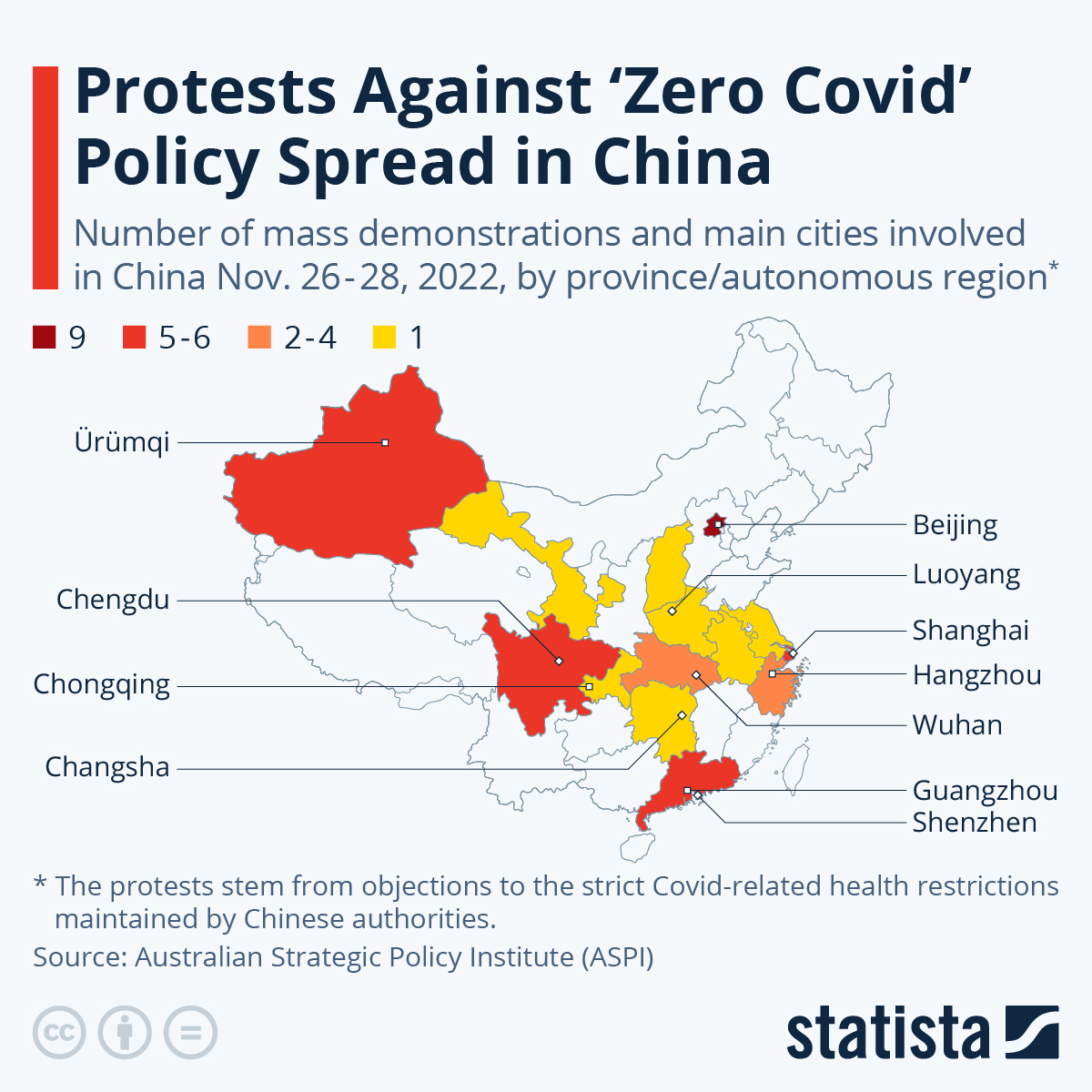China’s Covid Strategy: a Path Gone Wrong?
December 31, 2022 | Expert Insights

Barely a few weeks back, the whole of China celebrated the successful conduct of the 20th Congress of the CCP and the third time coronation of President Xi Jinping to the supreme authority.
With barely a fraction of fatalities compared to the million-strong death count of its bitter rival, the U.S., President Xi Jinping's Zero Covid policy, along with a slew of home-grown vaccines, seemed to have won the day for China over the pandemic. The proof was in the infection-free conduct of the Beijing Winter Olympics.
Sadly, things started unravelling rapidly as the year ended, and a huge number of infections spread across the length and breadth of this vast nation. The crisis has been compounded by Beijing's sudden and wholesale abandonment of the Zero Covid policy, allowing its billions to fend for themselves in a healthcare system which is, at best, fragile. The truth of the impracticality of the Zero Covid policy had finally dawned, but it would come at a price that perhaps millions of Chinese may have to pay with their lives.
Background
The Zero Covid was displayed in its full glory earlier this year during the Winter Olympics when the state meticulously created an 'Olympic Bubble'. Ever-present face masks marked it and non-stop spraying of disinfectants by lorries making the rounds of streets around the clock and testing at every street corner. Any infected visitor, or local, was swiftly identified and carted off to isolation centres run by the state. At the first trace of infection, whole city blocks and districts would be quarantined, with citizens isolated in their apartments for months together.
The success of the Winter Games, while the Omicron variant plagued the entire world, convinced Beijing that their strict regimented political system was far superior to the muddled handling of the pandemic by democracies like India and the U.S. Not surprisingly, President Xi himself never tired of highlighting this narrative in every public forum that he attended.
But deep within Chinese society, a historic public discontent was brewing. With local economies crushed by months of lockdowns and travel bans, the marginalised majority suffered economic woes. Protests erupted, especially in the restive Xinjiang province but were swiftly crushed.

Analysis
With millions being infected daily and the death rates being kept under wraps, hospitals and crematoriums overloaded, the question being raised is whether the Chinese strategy is the right one and whether enough attention was given to mass immunisation through modern methods. Was it a disaster waiting to happen?
Sometimes success can lead to wrong conclusions, which appears to be why the Chinese authorities were lulled into complacency after the success in the conduct of the Winter Olympics. Lockdowns, quarantines, and mass testing-tracing was considered adequate to keep hospitals free of patients. It was perhaps assumed that a bouquet of relatively cheaper vaccines (unlike the more expensive and technically superior mRNa-based one) combined with lockdowns could defeat the virus. So while the infection rates remained low, the so-called herd immunity was also not achieved, neither through 100 per cent vaccination of the populace nor through natural infections like it took place in India.
The COVID virus showed its virulence when it slipped through the great wall of China in March and infected thousands in the Jilin province and Guangdong. After 3500 infections were detected in a day in Shanghai, the financial centre of millions faced a harsh and total lockdown that lasted more than two months. It shattered the economy of this prosperous region, and China's GDP plunged by 2.6 per cent by June, with unemployment rates rising to a record 20 per cent. The signs of the failure of a Zero Covid policy were clearly on the wall, but Beijing still refused to read them. No provincial chief had the nerve to tell the central authorities that they were going terribly wrong, and the errors were compounded.
With the Party Congress scheduled in October, the CCP dared not change its stance and lose face in front of the masses. So the policy continued as infection rates continued to rise. The ubiquitous and ever-loyal People’s Daily continued to repeat ad nauseam that the Zero Covid policy was ‘practical and sustainable.’
The dam burst in November when an apartment fire in an Uyghur-majority neighbourhood in Ürümqi, Xinjiang, killed many innocent Uygurs, triggering long-suppressed public anger not only in Xinjiang but across the nation including parts of Beijing. It was alleged that the mortalities in the Urumqi fire were aggravated by the lockdown measures, which considerably delayed rescue operations. As per western estimates, protests were striking and unprecedented, involving workers, university students and common citizens in cities and rural areas.
Then suddenly, in December, restrictions started getting dismantled as Beijing revoked its central authority allowing provincial authorities to take their own call. By Dec 7, the Zero Covid Policy no longer existed. However, Beijing has narrowed the criteria for defining a COVID death due to respiratory failure and complications arising out of any variant of Coronavirus. Apparently, this is contradictory to the WHO guidelines. Only one death each was reported in mainland China on the 29th and 30th of December from COVID.
Alarmed by the low official infection and death rates being announced by Chinese officialdom, the WHO has formally asked the Chinese government to 'share real-time data.' India and many other countries have re-imposed COVID restrictions on travellers coming from China, although there were loud demands for a total travel ban. Official Chinese spokespersons have decried even these restrictions as 'unscientific' and 'unfair.'
Assessment
- Sadly, we are once again living through the nightmare of the start of the COVID pandemic in 2020, when China delayed the truth for so long that ultimately millions across the globe had to pay the price with their lives. It would be suicidal to repeat the mistake.
- The world has learnt that pandemics respect no boundaries or nationality-only a collaborative global effort can kill the virus for good. The world community, instead of gloating on the discomfort of the Chinese government caught in a bind, must join hands to alleviate the sufferings of the Chinese people by rushing vaccines, anti-viral drugs and whatever it takes to ensure China, and the rest of the world, does not return to the horrors of the pandemic in 2023.








Comments